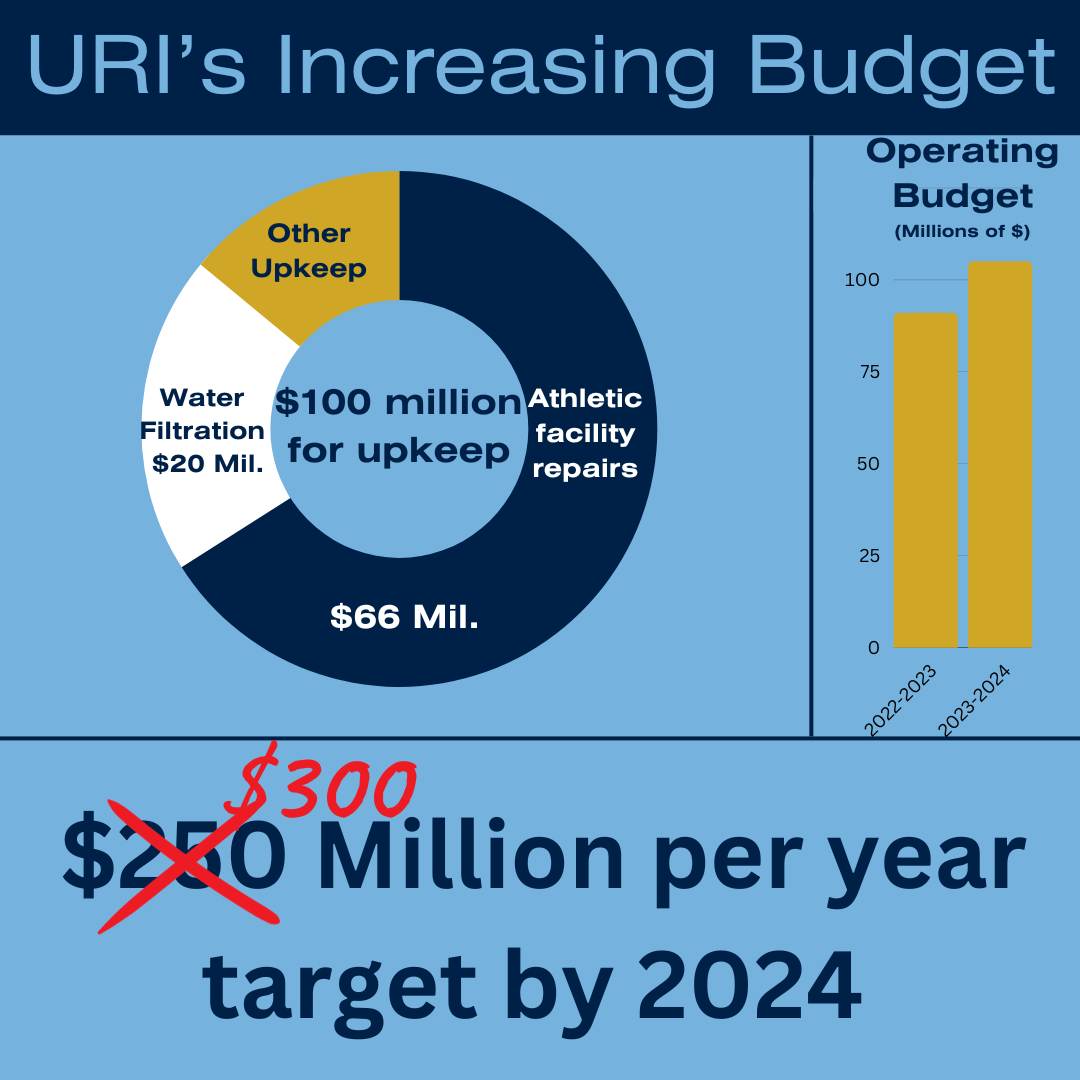After nearly three decades of gradual decrease in the operating budget, the state of Rhode Island has given the University of Rhode Island $105 million for the 2023-2024 fiscal year.
This is a 16% increase from the $91 million received last year.
In addition to this large operating budget, which handles the yearly expenses of running the university, URI has several other sources of funding.
The Rhode Island Capital Plan (RICAP) gives the University funds for the repair and maintenance of University buildings and facilities. URI holds a quarter of Rhode Island’s buildings, and in turn received $100 million dollars from the state for the upkeep of these facilities. $66 million of this budget went to repairing athletic facilities, and $20 million went to filtering drinking water on campus.
In addition to funding from the state, Rhode Island state senators advocate for URI to receive federal funding.
“Jack Reed and Sheldon Whitehouse are extremely important in supporting us,” URI President Marc Parlange said.
Rhode Island voters also play an important role in getting funding for the University. Last fall, the University ran its Yes on 1 campaign, where citizens could vote to give the University’s Bay Campus $100 million for a new oceanography building.
According to Parlange, URI has the oldest ocean engineering graduate program in the country.
“We have a very distinguished and long history of excellence in oceanography, but our facilities were atrocious,” Parlange said. “A strong percentage of the voters supported our general obligation bond for the Narragansett Bay Campus. We’re trying to really lead and build the blue economy for the state of Rhode Island.”
Philanthropy is another important source of funding for the University, and URI is on track in its campaign to raise $300 million by 2024. When the University surpassed its initial goal of $250 million a year ahead of schedule, they raised their target to $300 million.
“We really appreciate people stepping up to support students,” said Parlange.
The University also received $125 million this year from research grants, including the National Institute of Health (NIH), National Science Foundation (NSF), National Oceanic and Atmospheric Administration (NOAA), Environmental Protection Agency (EPA) and more.
President Parlange and the University have many plans for the increase in budget this year, and this includes continuing their Focus URI ten-year strategic plan.
“This plan outlines a strategic vision for the University of Rhode Island for the next decade—articulating our aspirations to broaden our impact, enhance student achievement, foster an inclusive culture, and power the University of the future, and the actions we will take to achieve those goals,” according to the Office of the President on the University website.
President Parlange also wants to put the increase in funds back into education and prioritize the student experience at URI.
According to Parlange, the University is committed to supporting their graduate and undergraduate students, as well as supporting their faculty and staff.
“We want a student experience that is second to none,” said Parlange.
Students are also excited about the increase in budget and what that means for their experience at URI.
“I’m really excited to see what the University does with the increase in funds,” Emma Cotter, second-year dietetics student said. “As someone who’s really interested in research, I think it would be great to see more opportunities for undergraduates to lead their own research projects about topics that interest them.”
The University is very grateful for the continued support of state and federal leaders.
“We also appreciated that lots of senators and representatives have come down to campus to visit, see our facilities, and take the time to really understand what the opportunity is here at URI,” said Parlange.
The fiscal year began on July 1, and the University is set to put in their official budget request at the end of September.
According to Parlange, the University has been working on preparing the budget request this summer, and will continue to work on it during the early school year.

